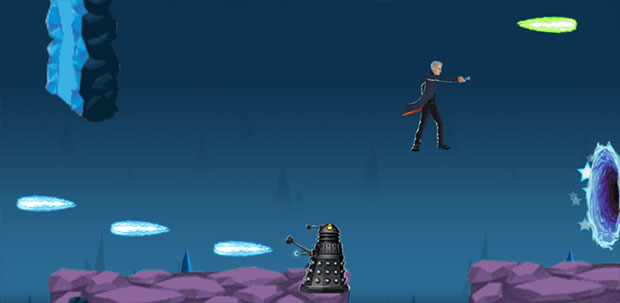The Doctor Who Game Maker Is A Bit Rubbish But Vital
Wibbly-wobbly
The essential problem with modern Doctor Who - other than its broad abandonment of science fiction in favour of magic did it - is that it's a show which earns an enormous amount from kids' merchandise but whose most fervent audience is adult. This creates impossible expectations: to be light and fluffy and full of funny monsters, but to be complex and dark and with long, involved plot arcs filled with secrets and lore. The BBC's laudable Doctor Who Game Maker project is entirely stranded in that vast no man's land between 'y'know, for kids' and adult expectation. Create your own Doctor Who game - here are easy tools and a ton of official artwork to use as you like, then share it with the world. Anything your imagination can conceive, etc, etc.
The reality: hope you like crude platformers! But I think this is an extremely worthwhile project nonethless.
The tool is limited, and so too are the results. It was perhaps unfair of me to expect much from a free, browser-based application that is essentially a promotional tool, although it is part of the BBC's Make It Digital campaign, which is designed to help young people understand the rudiments of programming and design. In these job-poor times, giving kids a leg up into an increasingly digital future is only a good thing.
I'd hoped that the tool would offer scope to write your own text and perhaps basic physics puzzles, but it's pretty much restricted to dragging and dropping platforms, enemies and collectibles then jumping and blasting your way through very short levels. As such, there's very little variety in the games released so far, although it's not impossible that, in the longer term, people will create more ambitious games.
There are already two recurring variations kicking around - Asteroids clones and a sort of top-down maze game. Real ingenuity, in terms of seeing through the application's limitations and turning them to new purpose, does occasionally creep in - such as the guy who's built a labyrinthine series of corridors out of stitched-together platforms, through which you steer a spaceship while giant lasers chase you, or building platforms out of hovering Dalek saucers. The vast majority are maddening platformers with far too many insta-death jumps and enemies, but that is perhaps to be expected.
Where this is valuable, I think, is in the necessity to think about the space you're making, no matter how basic or repetitive its contents may be. What flows? What is fun? What looks enticing? What's too easy, what's too hard, what's satisfyingly challenging? The tool is so simple to use, in the main, that there is real freedom for a young creator to be thinking about this - about level design, about what makes a game rather than simply a random collection of Daleks and lasers - rather than battling to understand the UI or the lingo. First attempts will, almost invetiably, involve shoving everything in there, as many Cybermen and Tardises as possible, but that's going to lead, in the best cases, to thoughtfulness: hang on, what can I actually make? What feels good? What else can I add to it? What do I want to show other people?
Simply looking at the way people have decorated levels is fascinating - it's a sort of sticker book concept, but there are ones which look like nonsense, ones which look stark and ones where you can tell someone's really tried to introduce a theme. Basic, limited, repetitive, yes - but it's getting someone's mind working. The tutorials are probably the most valuable thing here - they introduce language and concepts vital to game-making, granting clear insight into how our digital worlds get made, even if the results here are inescapably simple.
There's also occasionally gonzo stuff, like controlling five Peter Capaldis simultaneously, which is pushing against the limits of the tool and doesn't really achieve anything, but it's a consequence of the creator thinking 'what if?' and experimenting. Because this is Doctor Who, people are having a go - in a way they probably wouldn't were this simply a general game-making tool. If some kid makes a basic Dalek-blaster here then becomes frustrated they can't do more, perhaps they'll go seek out Gamemaker or something like that, and really get into it. Bright futures. Have a go.
(Damn shame there are no keyboard controls when it runs in Chrome, however. I used Internet Explorer in order to make anything playable/buildable).




